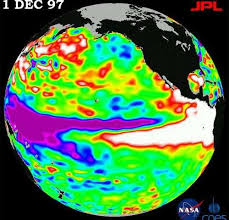Source: phys.org
A trio of researchers from Chonnam National University, Nanjing University of Information Science and Technology and the Chinese Academy of Sciences has found that a deep learning convolutional neural network was able to accurately predict El Niño events up to 18 months in advance. In their paper published in the journal Nature, Yoo-Geun Ham, Jeong-Hwan Kim and Jing-Jia Luo, describe their deep learning application, how it was trained and how well it worked in predicting El Niño events.
El Niño-Southern Oscillation events are periods during which water warms above normal temperatures in tropical parts of the Pacific. When that warm water moves east, it leads to more rainfall and other weather events, such as hurricanes, in the Americas, and less rain in Australia and Indonesia. Current models can accurately predict such events using data from water temperature gauges spread across the globe up to a year in advance. Scientists would like to be able to predict such events even sooner, however, because they can have a big impact on areas where the weather changes. Knowing when a drought is coming in Indonesia, for example, could help officials prepare food stores to feed people suddenly unable to grow their food for a period of time. In this new effort, the researchers took a different approach to predicting El Niño events using a deep-learning neural network rather than conventional weather forecasting models.
The researchers report that they trained their system using data collected from weather stations over the years 1871 to 1973. Data from such sources included a variety of weather and environmental measurements such as sea temperatures and average ocean heat content. The researchers also trained it on 300 El Niño events that occurred between the years 1961 to 2005. Once the system had been taught to recognize the conditions that lead up to El Niño events, they tested it using data from 1984 to 2017. They report that their system was more accurate than current weather models, correctly identifying 24 out of 34 events, compared to only 20 of the same events identified by conventional modeling. The system was also able to do so 18 months in advance. The researchers also report that their system was able to recognize other events that are believed to lead to El Niño events, such as an Indian Ocean dipole.
